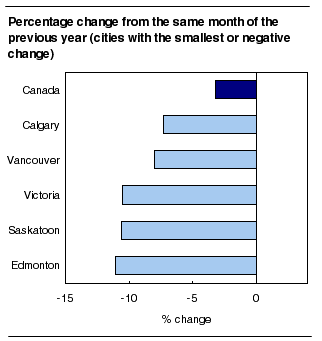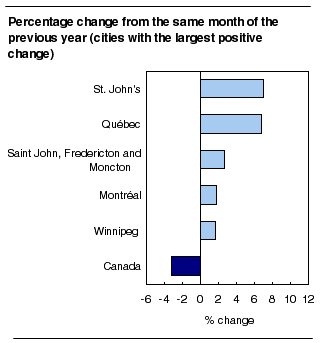Common menu bar links
New Housing Price Index
Archived Content
Information identified as archived is provided for reference, research or recordkeeping purposes. It is not subject to the Government of Canada Web Standards and has not been altered or updated since it was archived. Please "contact us" to request a format other than those available.
Contractors selling prices increased 0.3% in July following a 0.2% decline in June. This was the first increase at the Canada level since September 2008.
Between June and July, prices increased the most in Vancouver (+1.2%) followed by Hamilton (+1.1%) and Windsor and Calgary (+0.5% each).
In Vancouver, prices rose as consumer interest increased and the new housing market continued to improve.
In Hamilton, contractors reported that selling prices returned to their regular list price levels after several months of lower selling prices.
In Edmonton, prices rose by 0.4%, the first monthly price increase since October 2007. While some builders recorded lower selling prices in July, many builders returned to regular list prices after having negotiated lower prices in previous months.
The largest monthly decrease in new housing prices was recorded in Victoria (-3.5%). In response to slow market conditions, some Victoria builders reduced their prices in order to finalize sales.
Monthly declines were also observed in St. Catharines–Niagara (-0.3%) and Québec (-0.1%).
12-month change: Continued declines in the New Housing Price Index in Western Canada
Year over year, the New Housing Price Index was down 3.2%. The largest declines remained in Western Canada, where prices continued to fall from previous highs.
In the Prairie region, 12-month declines were recorded in Edmonton (-11.1%), Saskatoon (-10.6%) and Calgary (-7.3%).
On the West Coast, Victoria (-10.5%) and Vancouver (-8.0%) posted year-over-year declines as a result of weak market conditions. In Victoria, new home builders also lowered their prices in light of competition from the existing home market.

Among surveyed cities, the largest year-over-year increase was in St. John's (+7.0%). Although prices continue to increase year over year in this city, the magnitude of these increases is returning to levels seen prior to the record highs set in 2008.
In Québec, the 12-month growth rate was 6.8%, while in Montréal, prices increased 1.8%. Robust demand for available land in Québec has kept prices elevated in 2009 compared with 2008.
Compared with July 2008, contractors' selling prices were 2.7% higher in Saint John, Fredericton and Moncton. Winnipeg (+1.7%), Charlottetown (+1.1%) and Regina (+1.0%) also posted increases.

Available on CANSIM: table 327-0005.
Definitions, data sources and methods: survey number 2310.
The second quarter 2009 issue of Capital Expenditure Price Statistics (62-007-X, free) will be available in October.
For more information, or to enquire about the concepts, methods or data quality of this release, contact Client Services (613-951-9606; toll-free 1-866-230-2248; fax: 613-951-3117; prices-prix@statcan.gc.ca), Producer Prices Division.
Table 1
| July 2009 | July 2008 to July 2009 | June to July 2009 | |
|---|---|---|---|
| (1997=100) | % change | ||
| Canada total | 153.6 | -3.2 | 0.3 |
| House only | 161.1 | -4.1 | 0.4 |
| Land only | 137.9 | -1.6 | 0.0 |
| St. John's | 181.1 | 7.0 | 0.0 |
| Charlottetown | 121.0 | 1.1 | 0.0 |
| Halifax | 150.5 | 0.5 | 0.0 |
| Saint John, Fredericton and Moncton | 120.4 | 2.7 | 0.1 |
| Québec | 165.5 | 6.8 | -0.1 |
| Montréal | 165.3 | 1.8 | 0.0 |
| Ottawa–Gatineau | 169.7 | 0.6 | 0.0 |
| Toronto and Oshawa | 144.7 | -1.1 | 0.1 |
| Hamilton | 150.9 | -1.1 | 1.1 |
| St. Catharines–Niagara | 154.9 | -1.8 | -0.3 |
| London | 144.4 | 0.8 | 0.0 |
| Kitchener | 142.7 | 0.4 | 0.0 |
| Windsor | 104.2 | 0.4 | 0.5 |
| Greater Sudbury and Thunder Bay | 112.7 | 0.1 | 0.0 |
| Winnipeg | 182.9 | 1.7 | 0.1 |
| Regina | 250.9 | 1.0 | 0.0 |
| Saskatoon | 211.4 | -10.6 | 0.0 |
| Calgary | 230.0 | -7.3 | 0.5 |
| Edmonton | 208.3 | -11.1 | 0.4 |
| Vancouver | 114.3 | -8.0 | 1.2 |
| Victoria | 106.1 | -10.5 | -3.5 |

